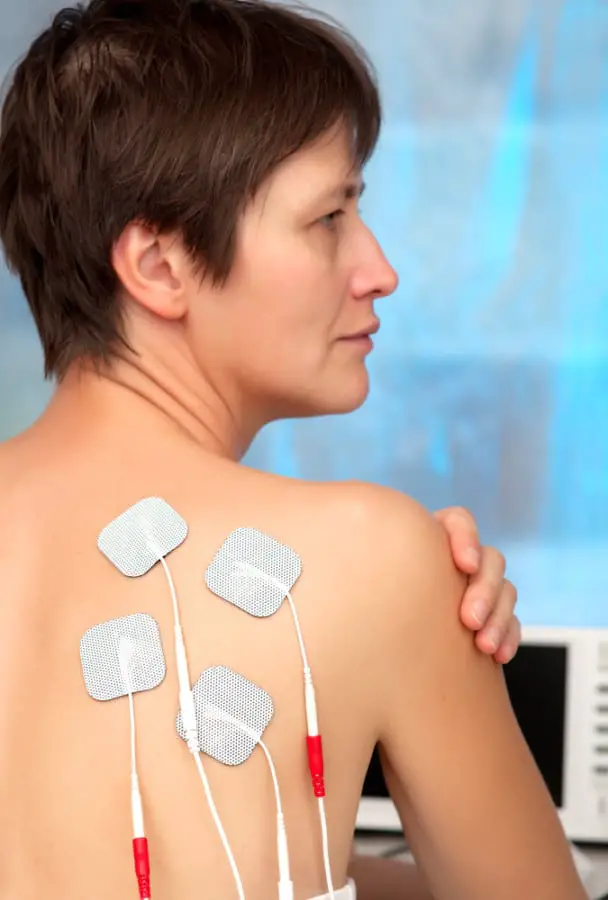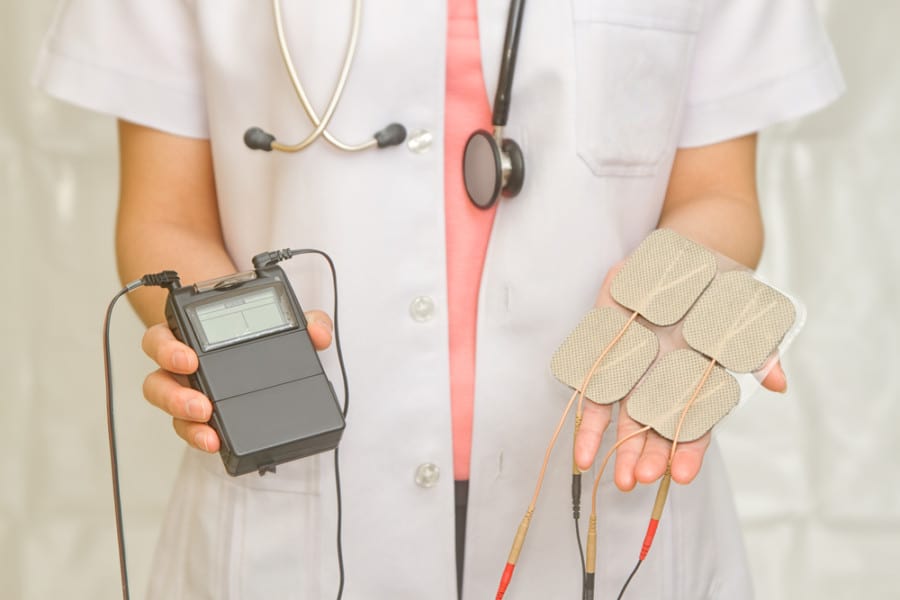People using a TENS unit love the pain-relieving benefits that come from this form of therapy but they also often wonder if you can overuse one?
You can’t get addicted to TENS as you can with other pain relief methods. However, with extended use you could grow tolerant to its effects (which would minimize its effectiveness). Over using a TENS unit can make the treated area sore or the skin sensitive. Having the settings too high can make the pain worse.
TENS is a very useful device that could help you in many ways. However, in order to get the optimal benefits from this device, you have to follow the proper guidelines when using it. Read on to learn out more about how to do this.
Are your settings for your TENS Unit too high? If so check out my article here to get the most out of your TENS unit safely and effectively.
Effects of Overusing a TENS Unit?

TENS units are generally safe to use for many different conditions, both acute and chronic. However, this is only true if you use it properly. Sometimes, though, side effects can occur even if you use it well.
For example, some people experience allergic reactions to the pads on electrodes because it contains latex. However, this can be mitigated by purchasing hypoallergenic pads and using them instead.
Another reason why you may experience discomfort is if the intensity is too high for you and your condition. While research shows that higher intensities are the most effective for pain relief, sometimes this can cause tingling, buzzing, or other similar sensations. They are generally mild, but they can be uncomfortable, so keep that in mind.
Using TENS should feel pleasant, and it shouldn’t hurt. If it does hurt, you should switch the settings while still using the device and decrease the intensity, so it suits you well.
It’s important to note that there are some people that shouldn’t use TENS. Here’s a list of who should avoid it:
- Pregnant women. Even though the device is usable during labor to decrease the pain, it’s not recommended for pregnant women, especially in their abdominal or pelvic area.
- Epilepsy patients. Electrodes applied to the neck or head on people with epilepsy could cause increased seizures and even induce them.
- People with heart issues.
- People who have implants like a pacemaker or any similar implant made of metal that uses electricity.
Before using a TENS device, you should communicate with your doctor and see if this device would work for you. They might have a better idea of how it may affect you, both positively and negatively. Some other conditions are not suitable for TENS either, so you should definitely contact someone familiar with your health.
Note: Applying the pads to the front part of the neck or the eyes is not recommended, as this could cause spasms and other issues. If your skin is extremely sensitive, you might want to avoid using TENS.
Similarly, patients with dementia and similar memory decline diseases should avoid using TENS as well. If you are not sure about whether your health allows for usage of TENS, you should talk to your doctor.
Want to know where a TENS unit can be placed? Check out my TENS placement guide here
The Side Effects of TENS if You Overuse It
Using TENS is generally safe, as mentioned, but overusing it is possible. Research suggests that people who use TENS too much can grow tolerant of its effects. So, in that aspect, you could potentially overuse it.
To avoid overuse issues, you can figure out a plan of therapy with your doctor and follow it regularly. For example, you could use TENS twice a day for 20 minutes at a time. Remember that higher intensities are more effective in the sense that pain relief can last longer, but that they can be uncomfortable.
- To use TENS properly, you would need to apply electrodes to the area of pain. You should make sure that the pads on the electrodes are well-attached to your skin. There’s also a gel that you can use to better conduct the electricity as it comes in contact with your skin. After doing this, you should turn the device on and play with the settings until you feel comfortable with the intensity.
- You shouldn’t use TENS for longer than 20 minutes in one spot, as the pads could cause irritation to your skin, and you might experience soreness in the area where the pads were.
- Never use TENS with cold or warm packs as the electrodes should in no way come in contact with water. Don’t use it in a tub or while showering. Don’t use TENS while driving either, as it could cause issues and accidents. Don’t use TENS while sleeping, although it could help you fall asleep. You might be able to use it for short naps.
Closely monitoring the effects of the TENS unit is important since you want to notice if anything goes wrong. If you keep it on for too long, you could suffer harmful effects.
- If you use TENS too much, you can also expect side-effects like muscle soreness. At most, you should use TENS for a few hours a day. Take breaks when using it and stop at any point if you feel pain or discomfort.
How to Use a TENS Unit Properly?
TENS is a form of therapy for acute and chronic pain. It resembles an MP3 player in design — it’s portable and powered by batteries.
Aside from relieving pain, it can also boost the production of endorphins, natural pain-killers. While using it, you will feel a tingling sensation that will be mild in intensity. Pain when using TENS doesn’t mean that it’s working to relieve your pain, but rather that it’s working too much and that you should decrease the intensity.
Electrodes that are held by adhesive pads on your skin will send these electrical currents out, but you have to find the right spots for them. You can find help with your doctor or by reading up on acupuncture.
Here’s how to use TENS properly:
- Before you start using TENS, both control switches should be turned off. You’ll later use them to control the settings on the machine.
- Clean the skin where the adhesive pads will be. The skin under adhesive pads needs to be completely dry and clean if you want to avoid irritation. You can use rubbing alcohol.
- Put the gel on the pads. You shouldn’t use too much — a thin coat will do. This gel will conduct electricity.
- Put electrodes on your skin. Find the right spot beforehand and mark it so that you can find it later with ease. If you can’t reach the spots where electrodes should be, ask someone to help you.
- Plug the electrode wires into the unit and turn the control switches to a setting that feels comfortable to you.
After using a TENS unit, you should turn it off and unplug the wires from the unit. If you want to have another treatment, unplug the electrodes and then change their placement. Clean the area where the electrodes were. Soap and warm water will remove the gel and anything else on the skin.
You can use water and soap to clean the electrodes as well. Remove the batteries from the TENS unit if you don’t want to use it soon, and charge them. You can also use lotion on the skin where electrodes are often placed in order to keep it safe, but remember to clean it off before using TENS.
Conclusion
Even though TENS is quite safe, you can overuse it or misuse it — in these cases, you might feel pain or similar issues. However, if you follow these guidelines, you will get the most out of TENS without feeling any of the side effects.
Remember to stay away from water while using it, and make sure that you don’t have any health conditions that prevent the usage of TENS. For any information that you need about your treatment, always consult your doctor first.
Sources
- NCBI: Response of plasma beta-endorphins to transcutaneous electrical nerve stimulation in healthy subjects.
- NCBI: Effect of low- and high-frequency TENS on Met-enkephalin-Arg-Phe and dynorphin A immunoreactivity in human lumbar CSF.
- NCBI: Using TENS for pain control: the state of the evidence
- NCBI: Transcutaneous Electrical Nerve Stimulation (TENS)
- NCBI: Effectiveness of Transcutaneous Electrical Nerve Stimulation for Treatment of Hyperalgesia and Pain
- University of Iowa: Transcutaneous electrical nerve stimulator (TENS)
- NCBI: Increasing intensity of TENS prevents analgesic tolerance in rats
- University of Rochester: TENS Therapy
- Cleveland Clinic: Transcutaneous Electrical Nerve Stimulation (TENS)





3 responses to “Can You Overuse a TENS Unit?”
[…] Using a TENS unit is safe but overuse can lead to becoming tolerant to its pain relieving effects. To learn more check out my article here. […]
[…] Can you overuse a TENS Unit? Learn more here […]
[…] you overuse a TENS unit? Click here learn […]